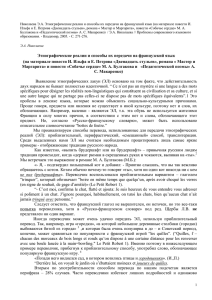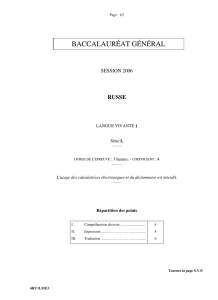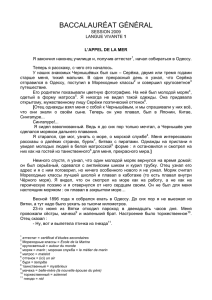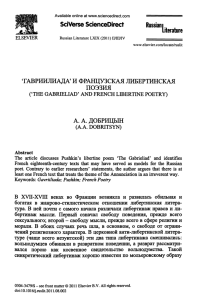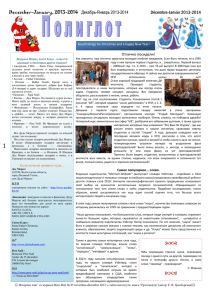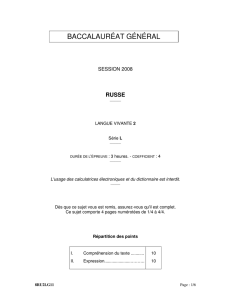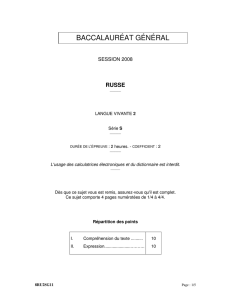Christian F. Lettmayr
реклама
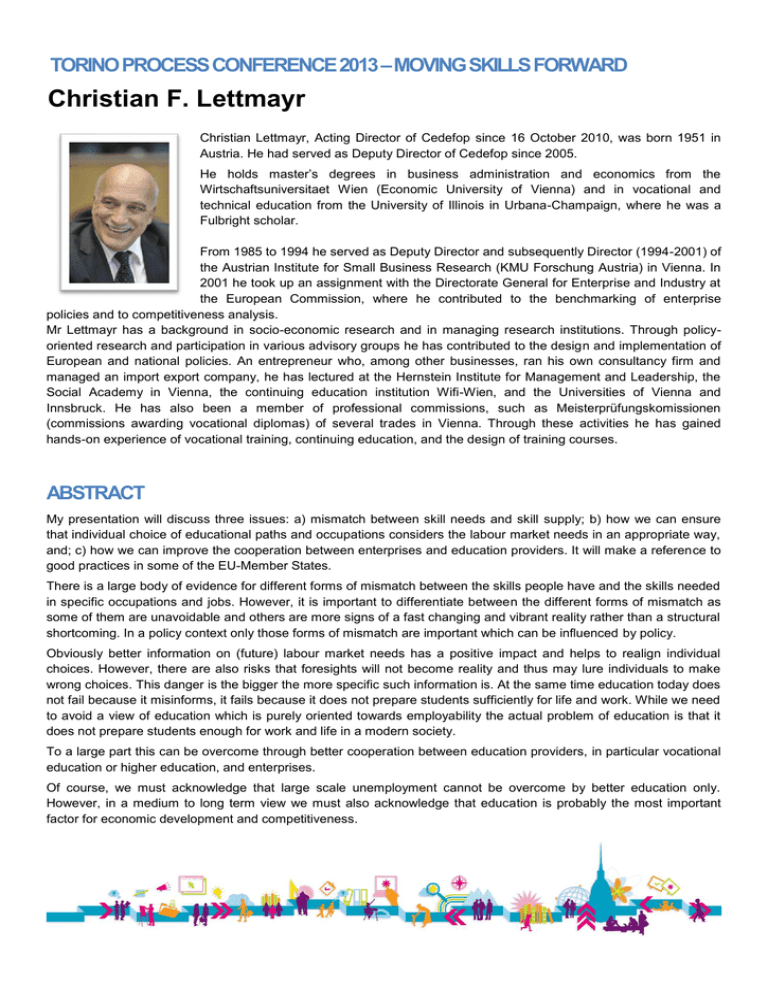
TORINO PROCESS CONFERENCE 2013 – MOVING SKILLS FORWARD Christian F. Lettmayr Christian Lettmayr, Acting Director of Cedefop since 16 October 2010, was born 1951 in Austria. He had served as Deputy Director of Cedefop since 2005. He holds master’s degrees in business administration and economics from the Wirtschaftsuniversitaet Wien (Economic University of Vienna) and in vocational and technical education from the University of Illinois in Urbana-Champaign, where he was a Fulbright scholar. From 1985 to 1994 he served as Deputy Director and subsequently Director (1994-2001) of the Austrian Institute for Small Business Research (KMU Forschung Austria) in Vienna. In 2001 he took up an assignment with the Directorate General for Enterprise and Industry at the European Commission, where he contributed to the benchmarking of enterprise policies and to competitiveness analysis. Mr Lettmayr has a background in socio-economic research and in managing research institutions. Through policyoriented research and participation in various advisory groups he has contributed to the design and implementation of European and national policies. An entrepreneur who, among other businesses, ran his own consultancy firm and managed an import export company, he has lectured at the Hernstein Institute for Management and Leadership, the Social Academy in Vienna, the continuing education institution Wifi-Wien, and the Universities of Vienna and Innsbruck. He has also been a member of professional commissions, such as Meisterprüfungskomissionen (commissions awarding vocational diplomas) of several trades in Vienna. Through these activities he has gained hands-on experience of vocational training, continuing education, and the design of training courses. ABSTRACT My presentation will discuss three issues: a) mismatch between skill needs and skill supply; b) how we can ensure that individual choice of educational paths and occupations considers the labour market needs in an appropriate way, and; c) how we can improve the cooperation between enterprises and education providers. It will make a reference to good practices in some of the EU-Member States. There is a large body of evidence for different forms of mismatch between the skills people have and the skills needed in specific occupations and jobs. However, it is important to differentiate between the different forms of mismatch as some of them are unavoidable and others are more signs of a fast changing and vibrant reality rather than a structural shortcoming. In a policy context only those forms of mismatch are important which can be influenced by policy. Obviously better information on (future) labour market needs has a positive impact and helps to realign individual choices. However, there are also risks that foresights will not become reality and thus may lure individuals to make wrong choices. This danger is the bigger the more specific such information is. At the same time education today does not fail because it misinforms, it fails because it does not prepare students sufficiently for life and work. While we need to avoid a view of education which is purely oriented towards employability the actual problem of education is that it does not prepare students enough for work and life in a modern society. To a large part this can be overcome through better cooperation between education providers, in particular vocational education or higher education, and enterprises. Of course, we must acknowledge that large scale unemployment cannot be overcome by better education only. However, in a medium to long term view we must also acknowledge that education is probably the most important factor for economic development and competitiveness. TORINO PROCESS CONFERENCE 2013 – MOVING SKILLS FORWARD Christian F. Lettmayr RESUMÉ Comment aller de l’avant et permettre le changement? Principes et actions Mon exposé abordera trois thèmes: 1) l’inadéquation entre les besoins et l’offre de compétences; 2) la manière de garantir que les différents choix d’orientations éducatives et d’emplois tiennent dûment compte des besoins du marché du travail; et 3) la manière d’améliorer la coopération entre les entreprises et les prestataires de services éducatifs. Je ferai allusion aux bonnes pratiques observées dans certains États membres de l’Union. Nous disposons de nombreux éléments qui attestent de l’existence de différentes formes d’inadéquation entre les compétences des candidats et les compétences requises pour certains postes et emplois. Il convient toutefois d’opérer une distinction entre les diverses formes d’inadéquation dans la mesure où certaines sont inévitables tandis que d’autres traduisent davantage une réalité mouvementée et en rapide mutation plutôt qu’une carence structurelle. Dans le contexte des politiques, seules les formes d’inadéquation pouvant être influencées par une politique sont prises en considération. Il est évident qu’une meilleure information sur les besoins (futurs) du marché du travail a une incidence positive et contribue à réaligner les différents choix. Le risque existe toutefois que les prévisions ne se concrétisent pas, de sorte que les personnes pourraient être amenées à faire un mauvais choix. Plus l’information est précise, plus le risque augmente. D’autre part, l’enseignement d’aujourd’hui est un échec non pas parce qu’il donne des informations erronées, mais parce qu’il ne prépare pas suffisamment les étudiants à la vie et au travail. Si une vision de l’enseignement purement orientée vers l’employabilité est erronée, le véritable problème de l’enseignement réside dans le fait qu’il ne prépare pas suffisamment les étudiants au travail et à la vie dans une société moderne. Cet obstacle peut être, dans une large mesure, surmonté grâce à une meilleure coopération entre les prestataires de services éducatifs, en particulier de l’enseignement professionnel et de l’enseignement supérieur, et les entreprises. Force nous est, bien sûr, de reconnaître que le chômage à grande échelle ne se résorbera pas par la seule amélioration de l’enseignement. Toutefois, à moyen ou long terme, nous devons également reconnaître que l’enseignement représente probablement le facteur le plus important de développement économique et de compétitivité. ТУРИНСКИЙ ПРОЦЕСС 2013 - ОРИЕНТИР НА РАЗВИТИЕ НАВЫКОВ Кристиан Летмайер краткое содержание Туринский процесс: Часть B: Как мы будем идти вперед; как можно добиться перемен; принципы и действия В своей презентации я буду рассматривать три вопроса: a) несоответствие между потребностями в навыках и их поставкой; б) как мы можем гарантировать, что индивидуальный выбор образовательных путей и профессий должным образом учитывает потребности рынка труда; в) как мы можем улучшить сотрудничество между провайдерами образования и предприятиями. Будет сделана ссылка на некоторые примеры передовой практики в некоторых из государств-членов ЕС. Существует множество достоверных фактов по разного рода формам несоответствия между теми навыками, которыми люди обладают, и навыками, которые требуются в конкретных профессиях и на конкретных рабочих местах. Здесь важно дифференцировать разные формы несоответствия, поскольку некоторые из них неизбежны, тогда как другие скорее являются признаками быстрых перемен и живой действительности, а не структурных недостатков. С точки зрения политики важны только те формы несоответствия, на которые может повлиять политика. Очевидно, что положительное воздействие оказывает более совершенная информация о (будущих) потребностях рынка труда, которая помогает перенаправить индивидуальный выбор. Однако здесь существует риск, что прогноз не оправдается, а люди поддадутся соблазну и сделают неправильный выбор. При этом, чем более конкретной является такая информация, тем выше опасность. В то же самое время сегодня образование проигрывает не потому, что основывается на неверной информации, а потому, что недостаточно готовит учащихся к реальной жизни и работе. Здесь необходимо избегать такого взгляда на образование, который ориентирован только на возможности трудоустройства, так как фактически проблема образования состоит в том, что оно недостаточно хорошо готовит учащихся к работе и жизни в современном обществе. Такую ситуацию по большой части можно преодолеть посредством повышения сотрудничества между провайдерами образования, в частности, между провайдерами профессионального или высшего образования и предприятиями. Конечно, мы должны признать, что крупномасштабная безработица не может быть преодолена только за счет улучшения образования. Однако мы также должны признать, что в среднесрочной и долгосрочной перспективе образование, вероятно, явится самым важным фактором экономического развития и повышения конкурентоспособности.

